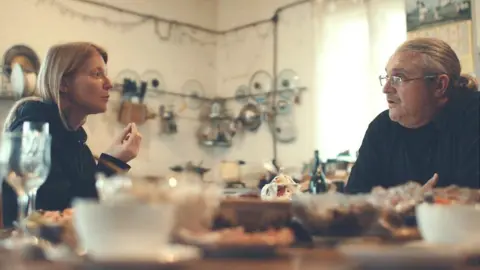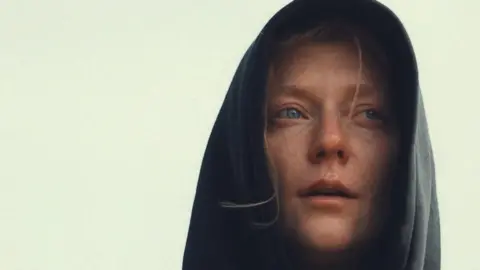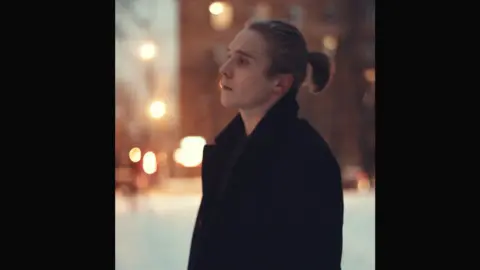How the Ukraine war is creating family rifts in Russia
 Anastasia Popova
Anastasia PopovaUliana is weeping as her brother's coffin is lowered into the ground.
The 37-year-old actress is attending the funeral of Vanya, a Russian soldier killed on the front line in Ukraine. "They said he died a hero," says Uliana of 23-year-old Vanya. "I thought, 'What does it mean, like a hero?' It's absurd. I don't want a dead hero for a brother."
But her father Boris, though also stricken with grief, is proud that his son Vanya died fighting for his country.
His view is that the conflict is a battle against "a government that preaches fascism". This claim echoes the words of Russian President Vladimir Putin, who says he is helping to de-Nazify Ukraine and that its government has carried out genocide - a claim for which there is no evidence.
"Before this happened with Vanya, we didn't discuss the war," says Uliana describing her relationship with her father. "But after he died we had some awful fights about it."
 Anastasia Popova
Anastasia PopovaIn a new film for BBC Storyville, father and daughter debate the war - a conversation playing out within many families in Russia today.
It is hard to get an accurate picture of exactly how people in the country feel about Russia's invasion of Ukraine, given legislation which outlaws any comments deemed to discredit the military, or which refer to the military action as a war rather than a "special military operation".
But a survey published in November 2022 by an independent Russian research group suggests it is dividing generations - 75% of respondents aged 40 and over said they supported the war, compared with 62% of those aged 18-24.
Russian filmmaker Anastasia Popova says this chimed with her own perception as she travelled round the country to shoot the documentary.
"I observed lots of different ruptures between families. Their children were mostly against the war, and their parents - the generation brought up during the Soviet Union, who watched [state-run] TV day and night - supported the war. I have the same rupture within my family," she adds, saying her father supports the military action.
Relying on state TV for news means absorbing the official narrative of the Russian government day after day. Uliana, and others of her age group, are more likely to get their news from other outlets, such as YouTube and social media.
"'Sorry' can't come close to expressing the grief I feel inside," says Uliana.
She says the war has changed people.
"I watch people on the metro [in Moscow]. They read the news, then look away. They've stopped looking each other in the eye."
Popova stresses that outside the big cities, support for the war is greater, regardless of the demographic. She says this became clear while she was filming Vanya's funeral in their home village of Arkhangelskoe, 60 miles [97km] outside Moscow.
Uliana speaks of this moment of recognition too.
"When I was watching those people, it came to me that they really believed the words that they were saying," she says, "[which were] that Vanya died like a hero, a true patriot who defended his motherland.
"I know that something is wrong. Who are we supposed to be saving there? What are our boys dying for? I never imagined in my life that my brother would be brought to me in a zinc coffin."
Vanya was the youngest of four siblings, and the only son.
"He was a golden boy," Uliana says.
"He had a broad upbringing," Boris explains. "Art school, music school, sport… I put everything I dreamed of into him."
After leaving home, Vanya joined a literary institute in Moscow to study creative writing and also acted in experimental productions, including at the Bolshoi Theatre.
Boris says this led to heartbreak for Vanya, who fell in love with a girl who didn't want to get married.
"This is the theatre world. With its own views of life. Its own ethical and moral criteria. In place of family values, they have open relationships between men and women," says Boris.
 Ivan
IvanUliana says Vanya seemed extremely happy in the theatre, but his father suggests that it provoked some kind of crisis in his son.
"He was not satisfied with their view of the world, that they are always negative about Russia; that Russians are nobody to them; that their ancestors, the whole history of Russia is full of nonsense. He understands that he's not like that. We talked about it. What should he do?"
So, Boris says, he and Vanya agreed that he should join the military.
"For a life in the creative arts.. you need life experience," says Boris. "Where can you find it? We decided he should follow in the footsteps of the great writers. That's the army."
Vanya joined the army as a conscript - and then, wanting more interesting challenges, took a military contract. He was a marine based in the city of Sevastopol in Russian-occupied Crimea when Russia launched its major assault on cities across Ukraine in February last year. He was told to call his family to say goodbye before being sent to the Ukrainian port city of Mariupol.
"We talked for a long time, over an hour," says Uliana. "He had tears in his eyes. I said: 'Vanya, show me what you have there.' He showed me a machine gun. Like he used to show me toys as a kid."
Boris shows a clip of Vanya's video message to him. "Our cause is just," Vanya is saying. "Hello to everyone. I'll write when I get there. Hugs and kisses."
"Those were his last words," Boris says.

Despite the huge risks, two Russian filmmakers have been filming the impact of the invasion of Ukraine in their country. Many thousands have fled. Those that have stayed have had to make a choice - oppose the war, support it, or stay silent.

He was killed near the Azovstal steel works in Mariupol on 15 March.
His death brought Uliana's and Boris's different views on the war into sharp focus.
Boris tells Uliana that she is too young to remember what he refers to as the "brotherhood" of the Soviet Union republics. He argues that its fall "broke the psyche of many generations to come, drumming into their heads that the Russians were their enemy".
His language is reminiscent of President Putin, who has called the fall of the Soviet empire the "greatest geopolitical catastrophe of the [20th] Century". Ukraine declared independence shortly before the Soviet Union collapsed in 1991.
The Russian president also puts blame for the war at the doorstep of Nato and the West, which he argues is trying to weaken and ultimately destroy Russia. Boris follows this narrative too.
"In today's context, 'No to war' only means one thing," Boris tells Uliana. "It means 'Death to the Russians'. This is a struggle for the Russian world, for the Russian soul, for our culture."
It is clearly not a view held by Uliana although she does, from time to time, waver.
Popova captures a moment when Uliana is on holiday in Georgia - one of the few countries Russians can still visit because of sanctions - and she and her friends discuss the war over dinner. Uliana begins to question the facts.
"I want to believe that my brother did not die in vain. You want to justify the loss. It's so painful. You need to hold on to something," Uliana explains.
A small shrine has been erected in Vanya's memory in the family home. It includes soil gathered from Mariupol where he died. At times father and daughter have stood before it together.
Uliana says that for all their differences she wants to maintain a relationship with her father.
"I can't go to war against my own father. I can't say 'I hate you because we disagree.' All I can say is 'Dad, I don't agree. That's all I can say.'"
